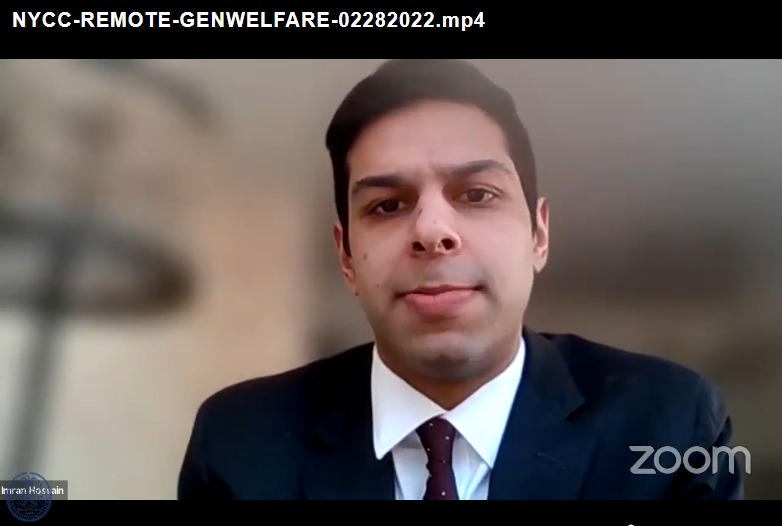On February 28, 2022, VOLS’ Staff Attorney, Imran Hossain testified at a hearing on the “Impact of the Expiration of the Eviction Moratorium” held by the New York City Council’s Committee on General Welfare. VOLS’ testimony highlighted the plight of struggling small businesses owners who have been unable to make rent over the course of the pandemic and for whom the eviction moratorium provided a lifeline, allowing them to renegotiate their lease terms so that they could remain in business.
VOLS’ testimony urged the Council to consider developing policies and programs and offering funding to support small business owners in need. Measures like these will ensure that small business owners are able to continue operating their businesses when facing economic hardship. Imran Hossain’s Testimony is below:
NEW YORK CITY COUNCIL COMMITTEES ON GENGERAL WELFARE
SUBJECT: Impact of the Expiration of the Eviction Moratorium

My name is Imran Hossain and I am a Staff Attorney in the Microenterprise Project at Volunteers of Legal Service (VOLS), a civil legal services organization serving all 5 boroughs, where I work with marginalized small businesses. In my role at VOLS, I provide counsel to scores of marginalized commercial tenants in our city facing innumerable systemic obstacles to small business ownership. As the Council considers solutions for residential tenants, we must also ensure we provide relief for struggling small business owners.
Even prior to the pandemic, NYC small business owners were facing the pressure of rising commercial rents. One study has shown that in the ten years between 2007 to 2017, retail rents increased by an average of 22%, with some neighborhoods seeing more than 50% increases in commercial rent. As a result, many neighborhoods faced 20% vacancy rates for commercial spaces. Often, our city’s most vulnerable population bear the brunt of this system. About three quarters of immigrant small business owners feel overburdened by commercial rent. Consequently, about one third of these business owners were forced to lay off workers in response to the increases in commercial rent. The downstream effects of unregulated commercial rent all came to fruition in the wake of the pandemic.
The COVID-19 pandemic has highlighted and accentuated many systemic injustices within NYC. However, unlike the disease itself, where we have developed an effective medicinal solution, we have not found a fix for the havoc that the pandemic has brought upon our marginalized small business owners – who are the overlooked backbone of this incredible city.
A substantial portion of small businesses in New York City were forced to shut down between March 2020 and July 2020. Many businesses have only recently reopened their doors. Even with these businesses now fully able to operate, it is no secret that economic recovery has been painstakingly slow. During the pandemic, with little to no business, these small businesses were not able to pay their rent. The only bargaining chip commercial tenants had to maintain their livelihoods was the eviction moratorium in which small business owners could claim financial hardship and have any eviction proceeding stayed until the expiration of the moratorium.
The moratorium proved to be a beneficial tool for landlords and commercial tenants alike. Because of the moratorium, landlords and tenants negotiated solutions to their disputes. As the eviction moratorium has ended, landlords no longer have the same incentive to negotiate with commercial tenants. And unlike residential tenants, commercial tenants do not have a right to counsel in eviction proceedings. Moving forward, our city needs to focus on policies and programs that incentivize collaboration between landlords and commercial tenants and level the playing field for commercial tenants who are facing potential eviction.
Recently, I was working with an immigrant, woman small business owner, who has operated a barbershop for over 20 years. Given the past 2 years, in which she had to totally cease operations for a substantial period, she was unable to pay rent and faced the prospect of losing her business to eviction. In the absence of the moratorium, the landlord would have likely pursued an expensive, time-consuming legal proceeding, only to receive an empty storefront, while the tenant would have lost her business – a local pillar of the community. Instead, the landlord and tenant worked together and found a mutually beneficial solution. I am happy to report that the landlord is receiving regular rent payments, while the small business owner can maintain her livelihood. In our experience, this was not an anomaly. VOLS has worked with dozens of similar clients on contracts such as payment plans, amicable termination agreements, and, lease amendments, whereby landlords often optimized their compensation in exchange for giving commercial tenants an opportunity to maintain their livelihoods.
In addition to legislation or potential funding to provide much needed relief to commercial tenants, we must ensure our small business owners are able to advantage of any newly created opportunities. About half of NYC small business owners are immigrants and many do not speak English as their first language or know their rights under the law. This all underscores the importance of ensuring that all potentially beneficial legislation, grants, and policies are disseminated in the most commonly spoken languages in New York City. A potential solution may involve equipping local community-based organizations with the resources and tools necessary to educate small businesses and assist them with accessing government programs.
As the city considers programs, funding, and policies to assist residential tenants who face eviction, we must not forget commercial tenants who are also struggling to make rent. For each small business that fails, not only does a family lose its livelihood, but workers lose jobs, and communities lose important services.
Thank you for the opportunity to submit this testimony for the Committee’s consideration. If you have any questions or would like to discuss further, please contact me at ihossain@volsprobono-org
To watch the video of the hearing and VOLS’ testimony, click here. Imran’s Testimony Begins at the 3:14:34 mark.
